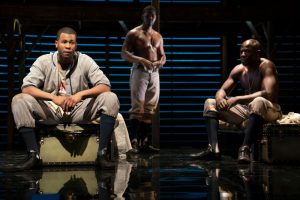
Charles Fuller won a Pulitzer Prize for Drama in 1982 for A Soldier’s Play which was originally staged Off-Broadway by the Negro Ensemble Company. That cast included Adolph Caesar, Denzel Washington, David Alan Grier and Samuel L. Jackson. Mr. Caesar was Oscar nominated in the film adaptation A Soldier’s Story which received additional nominations for Best Picture and Screenplay. That’s quite the pedigree which precedes this first Broadway production.
David Alan Grier returns to this story now in the pivotal role of Sergeant Vernon C. Waters. At the start of the play he is drunk and laughing. He yells, “they still hate you.” He is shot to death. What follows is a police procedural to determine the killer or killers.
A Soldier’s Play is set in Fort Neal, Louisiana in 1944 near the end of the second world war. This is a segregated fort. The enlisted black men are under the watch of a white Captain (Jerry O’Connell). They complain about the menial jobs they are given. A comment is made about being “lucky enough to get shipped out of this hellhole to the war.” Outside the base, the Ku Klux Klan looms but racism is omnipresent within as well.
The assumption is that the sergeant was murdered by the KKK deep in the heart of the Jim Crow south. A black officer, Captain Richard Davenport (Blair Underwood), has been assigned to this investigation. Naturally the presiding white officer objects and attempts to derail the process. In a series of interviews and flashbacks, the captain will get to the bottom of the mystery.
As staged by director Kenny Leon, this play captured my attention from start to finish. The ensemble work of the entire cast breathed palpable life into this production. While the play may seem dated as compared to this year’s mind-blowing Slave Play by Jeremy O. Harris, there are obvious reasons it remains relevant. Racism is hardly a historical footnote in America. Injustice lives and breathes in our government, in the prison-industrial complex and in the deeply rooted attitudes of countless millions.
What drives this play is not simply conflict between black and white men. There is a very fine scene when Captain Davenport interviews two white men (Nate Mann and Lee Aaron Rosen) who were on guard the evening of the murder. Their disgust at having to answer to a black man is not surprising but the effectiveness of how this new territory plays out is tightly wrought drama.
The soul of this play lies within the enlisted men. They have an easy camaraderie in the barracks and on their winning baseball team. Their black superior officer, Sergeant Waters, treats them like garbage. Waters’ racism is a complicated blend of self-loathing and aspirational whiteness. He has begun to climb the white man’s ladder and has definite ideas for his children’s future.
Mr. Grier is utterly convincing in this juicy role. Everyone on the stage has a reason to dislike him either from their inbred racism or their hatred of his condemnation of his own kind. His murder has many suspects. The police procedural part of this play is somewhat old-fashioned but completely entertaining.
Blair Underwood is terrific as the investigating captain. He is a black man with power. He wears his pride on his sleeve. His nuanced performance hinted at the battle scars he must have encountered on his rise. He does not back down ever. That skill had to be mastered. Unlike the white captain who runs the fort, he had to be exceptional to get as far as he did. That comparison registers nicely. (The matinee idol torso flash which opens the second act is the only misstep.)
A Soldier’s Play is not a masterpiece but it is a very good drama. This cast is excellent across the board most notably the grunts. Nnamdi Asomugha was a standout as Private First Class Melvin Peterson but each actor created a completely formed character. That makes for entertaining drama. The subject matter remains pertinent nearly forty years later.
The Roundabout Theatre Company’s production of A Soldier’s Play is running at the American Airlines Theatre through March 15, 2020.
